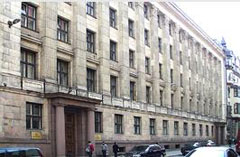Analytics, Economics, Financial Services, Latvia
International Internet Magazine. Baltic States news & analytics
Friday, 17.05.2024, 09:35
Ministry of Finance: Latvia's economy to contract by up to 13% in 2009
 Print version
Print version |
|---|
So far, state officials are reluctant to speak of precise figures, by how much the spending will have to be curbed; Swedbank economists have made estimates that budget deficit could amount to LVL 500 million to LVL 700 million, writes LETA.
The Ministry of Finance, jointly with the Economy Ministry, the Bank of Latvia and the International Monetary Fund, is currently drawing up new plans for tackling the expected budget shortfall, however, so far it does not reveal the strategy it has chosen for this purpose. Economy experts, polled by Diena believe that the state will not only have to cut down on spending, but also to decide on additional tax raises.
As reported, yesterday the prime Minister Ivars Godmanis (Latvia's First Party/Latvia's Way) said in an interview that the outlook on Latvia's economy is not auspicious.
Although the prime minister has pledged that taxes in Latvia would not be raised anymore this year, economists, polled by Diena believe that it is inevitable.
It has become known that in talks with the IMF, the government plans to discuss the option to increase the budget deficit, which is currently projected at 4.7%.
The current budget plan has been drawn up, taking in consideration the forecasts that the gross domestic product would shrink by 5%.
Economist Ojars Kehris estimates that the budget revenue in the beginning of this year has been around 30% lower than in the first months of the last year. In his opinion, the government should act similarly as an enterprise would – as it has no savings to spend, it should sell some of its assets, for example, the state-owned shares of the telecommunications enterprise Lattelecom. Kehris also suggests that the government apparatus should be reduced even more and its functions should be delegated to the private sector.
Swedbank senior socio-economist Peteris Strautins in his turn underlines that the society has not yet fully realized the gravity of situation, which is proved by the fact that trade unions are still demanding the value-added tax to be reduced to 19%. In Strautins' opinion, the society should become more united than before and those, who are in a better position, should be ready to make some sacrifices.
Again Kehris draws attention to the fact that the pressure on the social budget has now increased – its revenues are shrinking, but increasingly more allowances have to be paid out.
At the same time, experts underline that for the society to accept the unpopular decision that will be adopted, the government must restore people's trust in it. "Without trust and without professional governance it will be hard to introduce the reforms," Kehris says.
Also Strautins underlines that one of crucial preconditions that will allow the society to overcome the current situation, is to have faith that at one point the level of welfare will become better again.








 «The Baltic Course» Is Sold and Stays in Business!
«The Baltic Course» Is Sold and Stays in Business!

